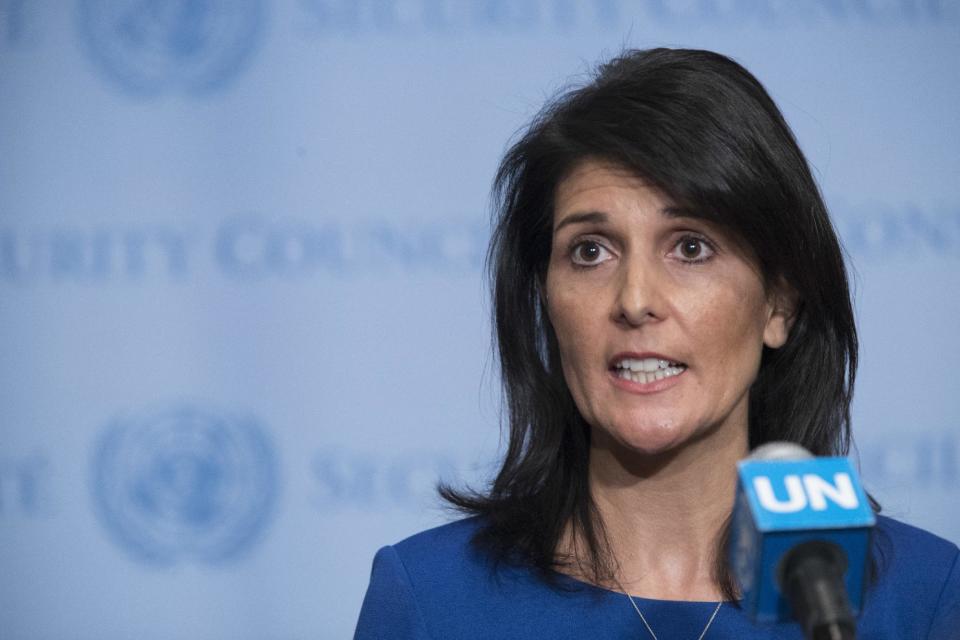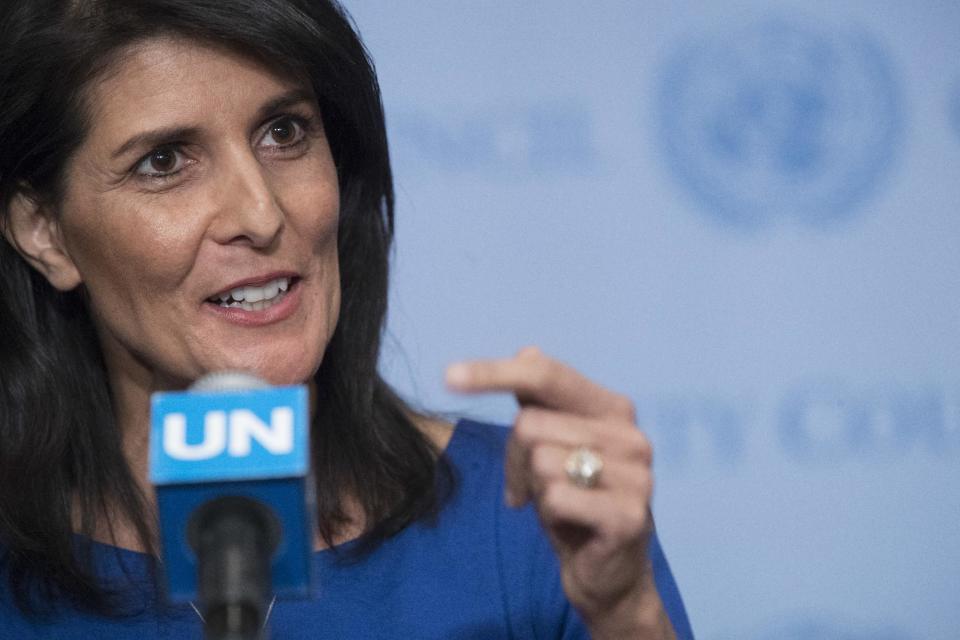US envoy: US supports 2-state Israel-Palestinian solution
UNITED NATIONS (AP) — U.S. Ambassador Nikki Haley said Thursday the United States "absolutely" supports a two-state solution to the Israeli-Palestinian conflict and anyone who thinks it doesn't is in "error."
But the Trump administration's new U.N. envoy told reporters: "We are thinking out of the box as well, which is: What does it take to bring these two sides to the table? What do we need to have them agree on?"
Haley's comments were far more forceful in support of a two-state solution than President Donald Trump's on Wednesday. He said: "I'm looking at two-state and one-state, and I like the one that both parties like. I can live with either one."
Haley said the solution to the conflict has to come from the Israelis and Palestinians, but she said several times and stressed: "We absolutely support a two-state solution."
Earlier Thursday, the United Nations and the Arab League issued a joint statement in support of the establishment of a Palestinian state alongside Israel, saying the two-state solution is "the only way to achieve comprehensive and just settlement to the Palestinian cause."
That appeared to put U.N. Secretary-General Antonio Guterres and Arab League Chief Ahmed Aboul-Gheit, who met in Cairo, at odds with Trump.
But Haley, when asked whether the United States would carry out its obligations under a U.N. Security Council resolution that called for the establishment of two states, said: "Understand that the United States supports the two-state resolution. That's never been wavered."
"What we're saying is, 'OK, let's not just talk about the old way of doing things.'" She said. "Come to the table with all the fresh atmosphere and perspectives that we now have, and think, 'OK, what can we do knowing all of the factors, knowing where we sit present day, and how can we move forward.'"
Guterres had stressed Wednesday that there is no "Plan B" to a two-state solution. Haley was asked if the United States had a "Plan B."
"I think first of all a two-state solution is what we support," she said. "Anybody who wants to say the United States doesn't support a two-state solution — that would be an error."
Trump also urged Israeli Prime Minister Benjamin Netanyahu during their joint news conference at the White House on Wednesday to "hold off" on Jewish settlement construction in territory claimed by the Palestinians for their future state, to try to facilitate talks.
"What the president has said and we agree on is that expanding settlements at this point is not helpful," Haley said. "That's basically what we're saying to both sides. Let's take a pause."
She said what Trump and the new administration are going to try to do is facilitate "some constructive action."
"We're just unbiased," Haley said. "Bring them to the table and say, OK, we're going to do this."
The U.S. ambassador spoke to reporters after attending the Security Council's monthly meeting on the Middle East — her first.
Haley was highly critical of what she called the anti-Israel bias in the U.N.'s most powerful body and the "one-sided" resolution that members adopted in December condemning Israeli settlements as a "flagrant violation" of international law.
"I'm here to emphasize the United States is determined to stand up to the U.N.'s anti-Israel bias," she said.
Haley said the U.S. will push for action on "the real threats we face in the Middle East." She cited "Hezbollah's illegal build-up of rockets in Lebanon" as well as the "money and weapons Iran provides to terrorists," and pointed to the need to defeat the Islamic State extremist group and to hold Syrian President Basha Assad accountable "for the slaughter of hundreds of thousands of civilians."
The U.N.'s Mideast envoy Nickolay Mladenov stressed at the council meeting that "the two-state solution remains the only way to achieve the legitimate aspirations of both peoples."
He also warned that the Israeli-Palestinian conflict must never be allowed "to drift into the abyss of the extremism and radicalism sweeping the region."
___
Associated Press writers Josef Federman in Jerusalem and Maggie Michael in Cairo contributed to this report




